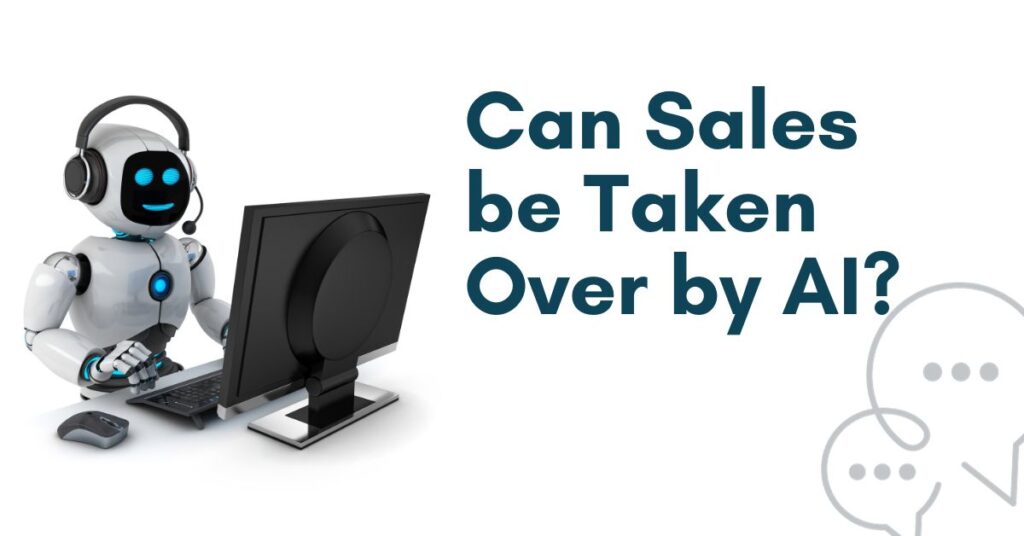Welcome to the digital age, where Artificial Intelligence (AI) changes the world. AI, especially in sales, is a game changer. It helps businesses manage sales better and make more money. AI tools for sales, AI software, and predictive analytics in sales greatly improve how well a business sells.
Picture a system that manages sales automatically. It predicts sales accurately, finds the best leads, and gives insights. Using machine learning, businesses can sell more. AI CRM makes connecting with customers personal, making their experience better, and they stay loyal.
Conversational AI is key in better customer service and increasing sales. This article looks at how conversational AI changes retail. It talks about how AI improves sales, personalizes promotions, and helps with customer feedback. It shows AI’s role in giving real-time help.
Want to see how Conversational AI can make your sales better and increase your earnings? Keep reading to learn more!

The Transformative Potential of Conversational AI in Retail
Conversational AI is changing the retail world. It uses NLP and machine learning to improve how companies talk to customers. This boosts business and makes shoppers happier.
Conversational AI makes each shopping experience special. It helps businesses understand what each customer likes. Then, it suggests items they might love, both in stores and online.
But it’s not just about selling. Conversational AI also listens to what customers say. This feedback helps businesses get better, serving customers more effectively.
This new tech is a game-changer for shops. It keeps customers happy and businesses growing. By using conversational AI, retailers might find success they never imagined in the digital world.
The Benefits of AI Tools for Sales Pipeline Management
AI tools give lots of help to businesses. They use AI to do tasks faster, make talking to customers better, and help choose the best ways to sell. With things like machine learning and smart predictions, AI can look at customer info. It then spots the customers most likely to buy. This makes selling easier and more efficient.
AI’s big plus is it can do many tasks automatically. This saves salespeople time, letting them focus on what they’re good at. It does things like entering data, scoring leads, and following up without needing a person there. So, salespeople get to work on things that really need their human touch.
Streamlining Prospect Interactions
AI also makes talking to customers smoother. It uses smart chatbots and virtual helpers to talk to customers fast. This helps keep customers happy all the time. It improves how customers feel about a business and makes them more likely to buy.
AI even guesses what customers might like, thanks to its learning. It then suggests products in a way that makes sense for each customer. This can lead to selling more things to the same customer, which is always good for business. Knowing what customers want helps sales teams offer exactly what they need.
Data-Driven Insights for Sales Optimization
AI is great at finding sharp insights in tons of data. It uses these insights to make selling smarter. Businesses get clearer tips on what to do next. This leads to sales plans that are more tailored and really good.
AI can also help with picking the best leads to follow up on. It’s really good at seeing which customers are more likely to buy. This means sales teams work on the best chances they have. The result is more sales from less work. It helps sales teams focus on what works best.
To sum up, AI tools are a big win for sales. They make many tasks easier, improve how we talk to customers, and offer new ways to sell. By using AI well, businesses can sell smarter, make more money, and keep moving ahead in the market.
Applications of Conversational AI in Sales Training
Conversational AI changes both how customers are served and how sales teams are trained. It brings interactive scenarios where salespeople can sharpen their skills. These exercises are both real and offer feedback, showing them how to grow. This method speeds up learning and boosts confidence in real sales calls.
AI in sales training helps through advice tools for common questions and tips. It gives sales reps instant help on product details and the best ways to sell. This means they can make better responses, know their products more, and make strong sales points.
Also, AI offers custom learning for each salesperson. It looks at their skills and finds ways to help them improve. This way, training fits them perfectly, making better salespeople over time.

AI enhances sales training by offering custom lessons, advising tools, and simulations. This helps sales teams become great at dealing with customers and making sales.
Streamlining Sales Processes with Conversational AI
Conversational AI is changing the way we do sales by adding automation and smart processes. It helps businesses do tasks more smoothly and boosts their sales. This results in making more money.
One important use of conversational AI is in finding the best leads. It looks at how customers act and guesses if they might buy. This helps salespeople pick out the best leads quickly. So, they can save time and use their resources better.
Keeping in touch and staying near to customers is very important. This is where conversational AI steps in. It helps companies follow up on leads without missing any. This kind of personal touch makes customers happier and more likely to stay with the company.
Conversational AI is also good at suggesting other products a customer might like. It checks what a customer bought before and offers things they will probably want. This makes buying more likely and makes customers happier.
AI is also able to see how a customer feels and changes how it sells based on this. By talking to customers in a way they like, companies can sell more. They can make their sales talks more personal. This helps customers feel good about buying from them.
Introducing conversational AI to sales does a lot of good. It makes tasks easier, but it also makes customers like buying more. It helps in finding the best leads, keeping in touch, offering good matches, and understanding what customers like. With all these abilities, businesses can sell more and make buyers happy.
Challenges of Implementing Conversational AI in Sales
Implementing conversational AI in sales comes with big benefits. But integrating AI with CRM systems poses a challenge. IT teams have to work to prevent compatibility issues.
Data synchronization is another hurdle. It’s vital to keep information consistent across all platforms. Cloud solutions make this easier with real-time syncing.
Complying with data regulations like GDPR is a big deal. Data security is crucial. Training staff on handling personal data is a must.
Dat synchronization and compliance with personal data regulations
Synchronizing data and meeting privacy laws are top hurdles. On the data front, keeping info aligned avoids confusion. This protects against problems that can upset customers.
Following data laws, like GDPR, safeguards privacy. It ensures secure and clear data handling. Trust with customers grows when legal rules are followed closely.
Seeking help from pros is key to success. They assist in AI-CRM integration, data management, and law compliance. Their guidance is invaluable.
With the right approaches, conversational AI in sales flourishes. Many gains await those who tackle these challenges head-on.
The Promise and Potential of Conversational AI in Sales and Training
Conversational AI is changing the game in sales and training. It boosts your team’s performance and gets great results. This technology offers personalized coaching and feedback. It also creates custom learning paths for your sales team.
One big plus of conversational AI is seen in lead qualification. It uses advanced algorithms to pick out top leads. Your team can then focus on these leads, leading to more sales and revenue.
Moreover, it cuts down on manual sales work by automating tasks. It allows for more personal customer engagement. This can make your sales better and your customers happier.
Enhancing Sales Enablement with Conversational AI
Conversational AI also boosts sales enablement. It gives your sales team the tools and advice they need. Through custom coaching, reps get personal help to improve their skills.
This technology also gives instant feedback. This means your team can adjust and get better right away.
Conversational AI even offers custom training for each salesperson. It spots strengths and areas to improve. This way, your team can reach their full potential and bring in more sales.

Optimizing Sales Performance with Real-Time Feedback
Real-time feedback is key for sales success. Conversational AI makes this feedback fast and easy. Your sales team gets immediate advice, helping them sell better.
This technology also watches sales metrics in real-time. It helps you spot areas to improve. With this insight, you can better focus your efforts and find new sales opportunities.
Selecting the Right AI Tools for Optimal Sales and Training
Choosing the best AI tools is essential. Go for tools that fit well with what you already do. They should be jam-packed with useful features but also user-friendly and cost-effective. Make sure you can count on strong support from the tool’s team.
Look for AI tools that support coaching, feedback, and personalized learning. They should also help with finding top leads, making sales processes smoother, and engaging customers in a personal way. Picking the right AI tools will make conversational AI work wonders for your sales and training needs.
Integrating AI with CRM Systems for Sales Optimization
Using AI with CRM systems is key in making sales better. It uses AI to change how you manage customer connections. This helps you earn more money.
AI makes managing leads easier. It looks at customer info to guess who might buy. It also uses AI chatbots and virtual help to talk to clients day and night.
These tools give fast answers and suggest products just for them.
Linking AI with CRM lets you see customer trends. It helps find ways to sell more. This boosts your team’s focus, betters service, and builds trust.
By adding AI to your CRM, you enhance your sales skill. This helps your business get stronger.
Overcoming Challenges in Implementing Conversational AI
Conversational AI can transform your business. Yet, there are many challenges to face. To succeed, careful planning and smart strategies are key.
Integrating AI with CRM Systems
Bringing AI into your CRM system is tough. You need to deal with issues of compatibility and get advice from your IT team. Making sure your AI fits smoothly with your CRM stops workflow problems and keeps your data straight.
Data Synchronization Challenges
Making sure all your data matches up is another issue. Bad data leads to wrong insights and can ruin your AI’s impact. Using modern data management tools and cloud solutions helps sync your data better. This step can make your AI work more effectively.
Privacy Compliance and Data Security
Following privacy laws like GDPR is vital when using conversational AI. Keeping customer info safe should be your top goal. Set up strong access rules, use encryption, and train your team in handling data. This way, you stay private and meet the law’s demands.
Success in AI is possible by tackling these challenges. Even though starting may be hard, the benefits like better customer interactions and sales are worth it.
AI as a Catalyst for Sales and Training Excellence
Including AI in your sales and training can boost your team’s work and achieve excellence. AI tools provide personalized advice, immediate feedback, and courses designed for each person. This helps salespeople get better at their jobs. AI makes finding good leads faster, makes the selling process smoother, and makes customers happier.
AI doesn’t replace the normal way of training, it just helps it. It fixes any gaps in training and keeps making everyone better at what they do.
Good AI tools fit right in with what you’re already doing. They’re powerful, don’t cost too much, easy to start using, and offer great help. Using AI this way can improve your sales and training by a lot, making your team do amazing things.
Selecting the Right AI Tools for Sales and Training
Finding the best AI tools for sales and training is key. You want tools that work well with what you already have. They should boost your team’s efforts significantly. The right AI aids in achieving top-notch outcomes.
Features and Capabilities
AI tools for sales and training should have certain features. They need to offer personalized help, feedback in real time, and paths for learning that fit each person. These tools can help your sales team improve their performance consistently.
Affordability and Easy Setup
It’s important to find AI tools that are affordable and not hard to set up. Pick ones that are easy on your budget and simple to start using. Avoid options that are too complicated or need a lot of tech know-how. They might slow you down instead of helping.
Dependable Support
A good support system is vital when using AI tools. Choose tools that come with helpful customer service and easy-to-understand guides. Having reliable support means any issues can be solved fast, so you can keep moving forward smoothly.
Integration with CRM Systems
Look for AI tools that work well with your CRM software. Connecting the two helps in managing leads and dealing with customers better. It ensures that all important info flows smoothly, enhancing your sales strategies and customer interactions.
Lead Qualification Accuracy
Getting lead qualification right is important for successful sales. Check that the AI tools can accurately predict future leads based on data. They should make it easier to find the best prospects and push your sales team towards their goals.
Data Synchronization Capabilities
Efficient data syncing is crucial for your sales and training work. The AI tools you select should move data between systems with ease. This helps keep your information up-to-date and improves how well your AI processes work.
Picking the right AI tools is a major step in leveraging AI fully. Consider features, affordability, setup, and support to excel in sales and training with AI.
Conclusion
Conversational AI is changing how businesses handle sales. It helps them manage their sales pipelines better and improve sales performance. Using AI in sales can make companies more efficient and boost their sales.
With AI, companies can vet leads, follow up with customers automatically, and provide personalized experiences. This creates stronger relationships with customers and helps to influence their buying choices.
Of course, there are challenges to adopting conversational AI. Businesses might face issues like connecting AI with their customer relationship management (CRM) systems and keeping data up-to-date. But with the right plan, these obstacles are solvable.
Choosing the right AI tools is key. They should fit smoothly into what a business is already doing. Good AI should have strong features and match the goals of sales and training. By choosing well, businesses can open up new paths for training, connecting with customers, and making more money in the digital world.
FAQ
What is conversational AI and how is it transforming the retail industry?
Conversational AI uses methods such as natural language processing and machine learning to improve how customers interact with businesses. It makes customer service better, creates personalized shopping, and increases sales.
What are the benefits of using AI tools for sales pipeline management?
AI tools help by making sales work smoother. They do tasks automatically and make talking with possible customers better. By using data and smart technology, they help salespeople work more efficiently and give insights to help sell more.
How can conversational AI be applied in sales training?
Conversational AI helps salespeople get better at their jobs. It uses role-play and feedback to teach them. Also, it gives advice on products, so salespeople know more about what they’re selling.
How does conversational AI streamline sales processes?
Conversational AI helps by sorting through leads faster, following up with customers automatically, and finding more sales opportunities. It also makes sales methods fit the customer’s feelings and needs. This all works to better manage leads, involve customers, and increase sales.
What are the challenges of implementing conversational AI in sales?
Getting conversational AI to work with sales can have problems. Connecting it with company systems and keeping data up to date is tough. Also, making sure it respects privacy laws is a big issue that needs a lot of attention.
What is the promise of conversational AI in sales and training?
Conversational AI makes sales and training better. It offers personalized help and quick feedback to teams. It also helps in managing leads efficiently and makes customers feel well taken care of.
How can AI be integrated with CRM systems for sales optimization?
Mixing AI with CRM systems makes leads and customer care better managed. They use chatbots and other tools to always be there for customers. This then helps the sales team focus on the best leads and offer great service for lasting customer relationships.
What are the challenges in implementing conversational AI?
Challenges in adding conversational AI include making it work with other systems, keeping data in sync, and following privacy laws. To solve these, careful planning with IT experts and using good data management strategies is key.
How can AI tools enhance sales and training?
AI tools make teams better by giving individual feedback and special learning plans. They also help with finding good leads and making the sales process smoother. These AI tools help by making training even better and always working to improve everyone’s skills.
What should businesses consider when selecting AI tools for sales and training?
When choosing AI tools, businesses should look at how well they work with other systems, their coaching and feedback features, how accurately they assess leads, and data sharing abilities. The best tools should be easy to bring into the company, have great features, be affordable, and come with good support.
How can conversational AI boost sales and optimize performance?
Conversational AI helps by making interactions with customers better, the sales process smoother, and by giving feedback to teams. It improves how leads are managed, works to make customers happier, and in the end, helps increase sales.
What is the role of AI in sales pipeline management?
In sales, AI is key in managing pipelines. It does tasks on its own, makes dealing with prospects easier, and helps with strategies based on data. AI looks deep into customer data to find top leads, helps sales teams work better and gives useful advice along the sales journey.

